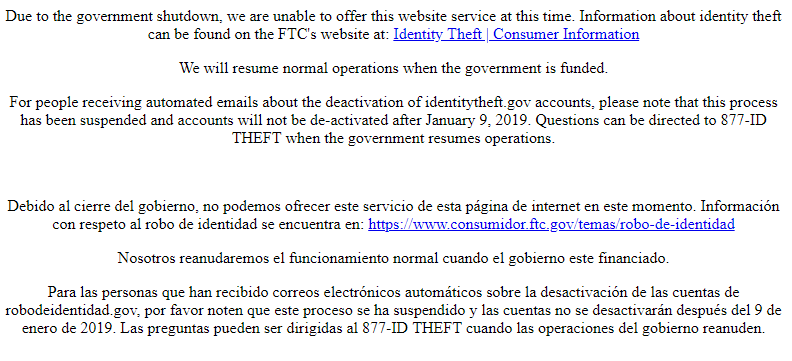The Government Shutdown is Hurting Crime Victims
Home Help Center The Government Shutdown is Hurting Crime Victims

By ITRC CEO, Eva Velasquez
For victims of identity crimes there are emotional, physical and lost opportunity costs experienced even when resources are provided quickly and competently. The government shutdown will make the aftermath for these victims worse. The Identity Theft Resource Center’s AftermathTM series sheds light on the less obvious but equally devastating effects of various identity crimes. It also highlights the downstream impacts regularly faced by victims. Right now, we are dealing with an obvious challenge on a national scale with the federal government shutdown. In keeping with our mission of advocating for victims, and increasing awareness of the complexity of the identity crime issue, I want to highlight some of the less obvious downstream effects our team is seeing impact not only victims but all citizens during this shutdown.
There is considerable attention being paid to the obvious consequences, and rightly so. Many folks, from federal employees to those that rely on government assistance to meet their basic needs, are certainly enduring hardship. However, there are other impacts, which are less obvious, and I feel compelled to share this perspective. This is not to make the point that these impacts are greater, or causing more harm than the ones previously mentioned, rather it is to shine some light on these less obvious consequences so that decision-makers and the public realize this is happening, and understand both the short term and long-term effects.
Currently, many departments of the federal government are shutdown. This includes the Federal Trade Commission. The FTC and the ITRC share similar mission, and a strong collaborative relationship. We have worked together on many initiatives to better the outcomes for identity crime victims. The individuals that we have worked with at the agency are amazing people, dedicated to helping victims and stopping the identity thieves. The resources that the FTC provides are an invaluable part of the remediation process.
What is notable about the shutdown for this department is that while ftc.gov remains fully functional, the identity theft assistance arm, identitytheft.gov and the associated call center are non-operational. That’s right; the website that victims go to for these invaluable resources is dark. Victims currently cannot obtain the FTC identity theft affidavit that is a critical first step for many, if not most, identity theft remediation plans.
Government shutdown advisory from identitytheft.gov
Until identitytheft.gov comes back online victims will need to go to their local police department and get a police report to move forward with proving their innocence. This is creating an increased workload for these local departments, a burden that was only recently lifted due to changes in the Fair Credit Reporting Act that allowed the FTC affidavit to serve as the report from a law enforcement agency in lieu of a police report.
If you believe that is not a big deal and at least there is some type of workaround, please realize that law enforcement agencies are not equipped to provide robust victim services for financial crimes victims (generally), which means they are not providing victims with remediation plans or helping them to put their lives back together. Their job is to investigate, get the bad guy, and hopefully stop the thief from harming others. Those plans come from the FTC and the Identity Theft Resource Center. As second tier responder, the ITRC receives referrals from the FTC, but with them unavailable, we’re now in the position to have to assist those victims as a first responder.
If for some reason there’s a belief that identity crimes are not a big deal, listen to what the victims are saying to understand that is not the case. You can read our Aftermath study and hear it directly from them.
The ITRC and all its resources are here for victims. We can be reached through our website www.idtheftcenter.org and our call center at 888-400-5330. Bear in mind that the shutdown has created an increase in our call volume, so please be patient.
In addition to the short term consequences, there are several long-term impacts that one will only be able to measure fully when this crisis has passed and we can unpack it using hindsight and data. One of the questions is has there been an increase in the actual number of incidents during this time period. The temporary closure of the investigative bodies that act as a deterrent will have some impact and decades of personal experience working with law enforcement and observing criminal behavior leads me to the conclusion: “Of course there will.” Identity thieves are opportunistic. Who actually believes they are not talking with each other and managing their efforts to capitalize on LESS oversight?
Another question: how much worse will the impact be for those that fall victim to identity crime during this window of closure? The ITRC knows from experience that early detection of this crime leads to quicker remediation and lessens the trauma, not to mention the total impact. We also know that consumers experience intense fear upon discovery of being a victim of identity theft. The availability of a plan of action allows them to feel empowered; giving them the ability to fight back against the powerlessness they might be feeling. Some will minimize this reaction and continue to see victims of economic crimes as overreacting, but I assure you that it’s not an overreaction. Those feelings are real. Moreover, when they cannot access the assistance they need, when they need it, it increases that feeling of powerlessness. Imagine that you come home to find that your home burglarized. It is obvious that the burglars are long gone, but all of your belongings have been touched and gone through, and many are missing. You feel violated. You need help and you need to get this reported and resolved. You call the police to get that help and are told they are closed, until further notice, so you just have to wait and try to wade through it. You think, can I clean things up? Do I have to take pictures? What if I mess something up and it creates more problems down the road. That’s exactly what identity crime victims are feeling when they get to the inoperable FTC website. Powerless.
Contact the Identity Theft Resource Center for toll-free, no-cost assistance at (888) 400-5530. For on-the-go assistance, check out the free ID Theft Help App from ITRC.
How much information are you putting out there? It’s probably too much. To help you stop sharing Too Much Information, sign up for the In the Loop.
Get ID Theft News
Stay informed with alerts, newsletters, and notifications from the Identity Theft Resource Center


